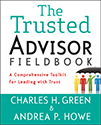This post is part of our Weekly Tips series.
When you increase credibility, reliability, and intimacy (the factors in the numerator) your trustworthiness increases. The flipside is that when you increase your level of self-orientation (the denominator), you decrease your trustworthiness.
Self-orientation is about focus. If your partner can say of you, “I trust that she cares about me and how this project will impact my career,” then your focus is on your partner, not on yourself, and your self-orientation is low. Paradoxically, self-awareness helps reduce self-orientation; the better you know your own fears and foibles, the more you can manage them and focus on others.
Bonus: Making it Real
This week, turn blind spots into insights. How?
See yourself as others do by seeking and integrating feedback. Bring to light aspects of yourself that are hidden from you but apparent to others. Ask three trusted colleagues to tell you what they know about you that they wish you knew about you. (Note: you might be surprised—and pleased—with the results.)
Learn More

- Find out if self-orientation is killing your trustworthiness, from our partners at Trusted Advisor Associates.
- Read more about the value of knowing yourself in Chapter 10 of The Trusted Advisor Fieldbook: A Comprehensive Toolkit for Leading with Trust.
Andrea Howe
Latest posts by Andrea Howe (see all)
- Role models for healthy candor - May 27, 2025
- A small gesture (and related risk) with big trust impact (Part II) - April 1, 2025
- A small gesture (and related risk) with big trust impact (Part I) - March 3, 2025
